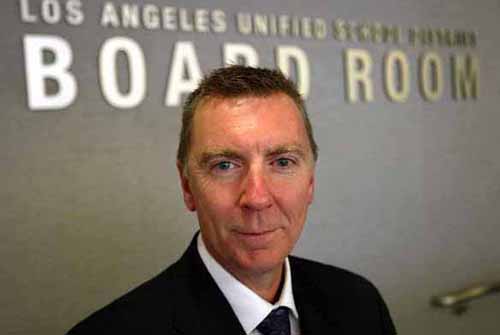LA schools Boss to be John Deasy, of fake degree and Gates (and Broad) foundation fame
The Los Angeles School Board is expected to name John Deasy, now serving as an under-boss to Superintendent Ramon Cortines, to be the new superintendent of the second largest school district in the United State, serving nearly seven hundred thousand students, employing about 45,000 teachers. Deasy came to Los Angeles in August 2010 and immediately became a major and controversial voice supporting "value added" performance evaluations for teachers. His rapid rise has also been attributed to his connections to the Broad and Gates foundations — as well as to a controversial claim to being called by the title "doctor."
Deasy claims to have earned his PhD at the University of Louisville (UL) in the College of Education. The Dean of the College at the time was one Robert Felner, now serving a jail term of 63 months for a variety of frauds committed against UL — and other universities.
 The controversial history of John Deasy (and the fact that his quickie "PhD" was awarded by a University of Louisville dean who later went to prison for fraud) seems to be no barrier to the top job in Los Angeles. Deasy has the support of both the Gates and Broad foundations, and that's enough for Los Angeles Mayor Antonio R. Villaraigosa.One charge against Feiner was the misappropriation of a $649,000 federal grant. In total, Felner was convicted of stealing $2.3 million in research grants. He was ordered to pay UL $51,000 and the University of Rhode Island $1.3 million. Felner resigned from UL in 2008. He was sentenced on May 17, 2010.
The controversial history of John Deasy (and the fact that his quickie "PhD" was awarded by a University of Louisville dean who later went to prison for fraud) seems to be no barrier to the top job in Los Angeles. Deasy has the support of both the Gates and Broad foundations, and that's enough for Los Angeles Mayor Antonio R. Villaraigosa.One charge against Feiner was the misappropriation of a $649,000 federal grant. In total, Felner was convicted of stealing $2.3 million in research grants. He was ordered to pay UL $51,000 and the University of Rhode Island $1.3 million. Felner resigned from UL in 2008. He was sentenced on May 17, 2010.
John Deasy earned his PhD directly under Felner, in a period of four months, earning nine UL credit hours.
Prior to coming to UL, Deasy had awarded Felner’s research company, the National Center on Public Education and Social Policy, a $375,000 grant from the Santa Monica district where Deasy was head.
Before he came to UL, Felner had been dean at the University of Rhode Island’s College of Education from 1996-2003. Deasy studied there in the same period, while Deasy was also a Rhode Island school superintendent.
According to a highly placed source, formerly at UL, Deasy’s dissertation’s title page carries the date, “May, 2003,” while it is signed off, “April 9, 2004.” He entered the program in January, 2004.
A UL investigation of the Deasy PhD did not condemn the practice. James Ramsey, UL president, who had turned a blind eye to Felner’s notorious corruption (the faculty gave Felner a “no confidence vote” in 2006, but he served at least two more years at UL with Ramsey’s full support), gave his nod to the “blue ribbon” investigation.
However, the UL handbook clearly states that a PhD candidate must spend two years on campus. More, it usually takes most students a minimum of three years. In addition, UL rarely allows a student to transfer more than six credits.
Deasy, after allegations rose up about his imaginary degree but before the investigation, was quoted in the Washington Post as saying, "If the university made errors in the awarding of the degree, I do hope they rescind it. My responsibility is to do everything I was advised and told to do. If I was advised wrong and given wrong information, the university needs to take responsibility for that. I certainly would not want anything unearned."
Some may find it odd that Deasy did not vigorously defend a scintillating body of work and an illuminating dissertation. His willingness to do what he is told is equally interesting.
In September, 2008, during an investigation done by Maryland Gazette.net, Deasy refused to release his academic records.
After meritoriously buying his PhD, Deasy went on to work with the Gates Foundation where he focused his eyes on teacher evaluations and merit pay.
He also served as superintendent in Coventry Schools in Rhode Island, Prince Georges County, and Santa Monica. He was a Broad and Annenberg Fellow.
The United Teachers of LA first met Deasy when the Los Angeles Times published their infamous “value added teaching” project which sought to link teacher effectiveness directly to test scores. Deasy heartily supported the effort, demanding that UTLA re-open the contract to include the measurement for matters of pay and promotion. UTLA rejected his demand.
UTLA, like other big districts, is now engaged in an internal election battle that will likely determine the direction of the union, that is, more retreats or a ferocious effort to emancipate education from the ruling classes.
[Rich Gibson has a real PhD from The Pennsylvania State University (you can look it up, dissertation online and really long too). He is an emeritus professor of education at San Diego State and is a co-founder of the Rouge Forum. He can be reached at RGibson@pipeline.com].

